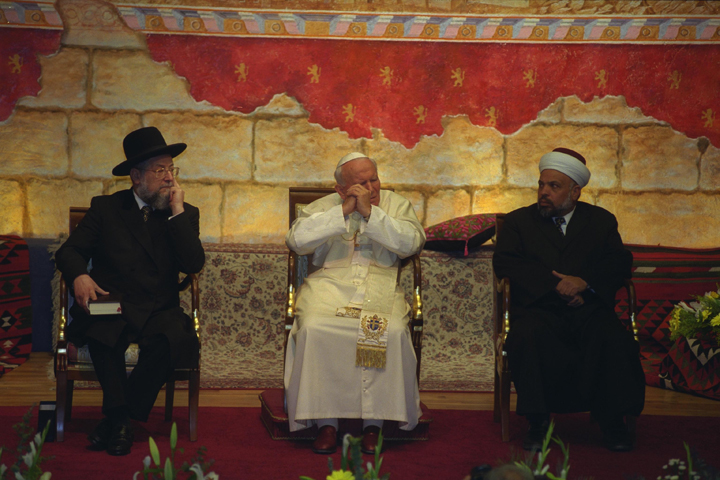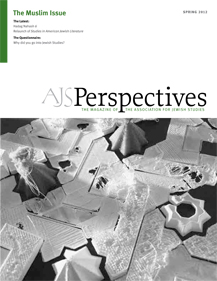
meeting at the Pontifical Institute, Notre Dame, Jerusalem, March 23, 2000. Photo by Amos Ben Gershom. Courtesy of the Israel Government Press Office.
Huguccio's problem was how to account for the status of Muslims, known as Saracens in Latin. Muslims, of course, are neither Christians nor Jews. By the logic of medieval canon law, this means that Muslims must be gentiles, which is to say pagans. Yet Huguccio also knew that "nearly all Saracens at the present Judaize: they are circumcised, they distinguish among foods, and they imitate other Jewish rituals. There ought not be any legal difference between them."
Huguccio resolved his dilemma by collapsing the centuries-old legal distinction between Jews and pagans. While not without its detractors—various jurists and theologians continued to regard Jews as posing a uniquely grave threat to Christian souls—Huguccio's definition of Muslims as legally equivalent to Jews became normative. Muslims living in Latin Christendom became subject to the same laws as Jews over the course of the late twelfth and thirteenth centuries.
Meanwhile, in the Muslim world, scholars of Islamic law were debating the legal status of Christians and, in particular, Christian acts of animal slaughter. Sunnis asserted that Christianity, like Judaism, is similar to Islam. After all, the Quran elevates the status of People of the Book over that of other non-Muslims by, for example, permitting Muslims to consume meat prepared by Jews and Christians. 'Shi'is countered that Christians and Jews know nothing of God's will and thus are not like Muslims at all. As a case in point, Shi'is claimed that Christian butchers invoke Christ, not God, when slaughtering their animals. Surely the Quran would not permit treating Christ as God!
Sunni jurists bent over backwards to preserve the permissibility of Christian acts of animal slaughter and, by extension, the definition of Christianity as similar to Islam in important respects. "God, praised be He, permitted their food even though He knew that they invoke a name other than God's over their slaughter," argued the early twelfthcentury jurist Ibn al-'Arabi. "Greater respect is accorded to them than to idolaters because they adhere to God's Book and cling to the coattails of prophets." Other Sunni authorities did not believe that God was quite so generous, but all assert that at least some meat prepared by Christian butchers is permissible. Ibn Qayyim al-Jawziyya (d. 1350), for example, declared that Christian butchers who invoke Christ are in fact heretical Christians whose meat is therefore forbidden to Muslims; orthodox Christians, however, invoke God alone, in accordance with the Quran.
Why should scholars of Jewish Studies care about the attitudes of Christians and Muslims toward one another? Let me offer three reasons, which, I believe, apply not only to the debates summarized above but more broadly as well.
Ideas about Jews and Judaism play an important role in the ways Christian and Muslim authorities viewed one another during the Middle Ages and, arguably, during modern times as well. Christian attitudes regarding Islam are intertwined with Christian conceptions of Judaism: the question Huguccio poses is, in effect, "How Jewish are Muslims?" Islamic authorities ask a different question—" How Muslim are Christians?"—but they, too, have Jews in mind. Ibn Qayyim al-Jawziyya, for example, discusses Christian butchers who invoke Christ alongside Jewish butchers who slaughter non-kosher animals. More broadly, Islamic authorities place Jews and Christians within the same legal category, "People of the Book."
Christians and Muslims pose different questions about one another. Unlike his Muslim counterparts, who compare Christianity to their own religion, Huguccio compares Islamic practices with those of the Jews. These comparisons reflect fundamentally different approaches to conceptualizing the relationship between Us and Them. Islamic law employs a sliding spectrum in which non-Muslims are like Muslims to varying degrees. In the context of discussing laws governing the bloodmoney due to the relatives of a murder victim, Muslim jurists even assign numerical values to these degrees: Jews and Christians, according to many Sunni authorities, are worth either one-third or one-half the value of Muslims, while Zoroastrians and other non-Muslims are worth only one-fifteenth. Shi'i sources, tellingly, declare that Jews, Christians, and Zoroastrians alike are worth only one-fifteenth the value of a Muslim. Canon law, in contrast, envisions a world polarized between Christians and Jews and imagines Judaism as antithetical to Christianity. Jews are not fractional Christians but rather anti-Christians (-1, to stick with our numerical values). Other non-Christians, the "gentiles," are neutral (0), so long as they aren't reclassified as being quasi-Jewish and thus thrust toward the negative pole.
Recognition of this dynamic does more than improve our understanding of Christian and Islamic ideas about Jews. It also enables scholars of Jewish Studies to query Jewish notions about gentiles more effectively. Pre-Rabbinic and Rabbinic literature alike attest to a binary distinction between Jews and gentiles analogous to the Hellenistic distinction between Greeks and barbarians. Jewish sources thus represent gentiles simply and literally as non-Jews: in numerical terms, 0. This paradigm differs both from the sliding spectrum used by Muslims to represent People of the Book as like Muslims and also from the antithetical framework employed by Christians to present Jews as anti-Christians. How and why do Jewish thinkers employ this distinctive worldview? In what contexts, for what reasons, and to what ends do Jewish thinkers supplement their binary paradigm with elements of likeness or antithesis? To what extent, if any, might intellectual exchange within Christian or Muslim cultures account for these adaptations to the classic Jewish approach to conceptualizing non-Jews? Familiarity with ideas regarding Christian– Muslim relations enables us to ask better questions about the ideas espoused by Jews.
The study of Christian-Muslim relations constitutes an important cognate field to Jewish Studies. Our discipline fosters scholarship about majority-minority relations and the distinctive attributes of minority life. Awareness of the dynamics that animate other instances of majority-minority relations furthers our ability to interpret our own data and to communicate our findings to colleagues who study other civilizations. Only if we understand Christian-Muslim relations can we answer, in a scholarly idiom quite different from that of Ibn al-'Arabi or Huguccio, such questions as "How Christian are Jews?" and "How Jewish are Muslims?"


